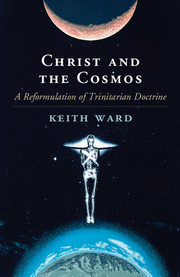Book contents
- Frontmatter
- Contents
- Preface
- Acknowledgements
- PART I THE THREEFOLD NATURE OF THE DIVINE BEING
- 1 Introduction: Talking about the Trinity
- 2 Why We May Need to Restate the Ways in Which We Talk about the Trinity
- 3 The Doctrine of Divine Simplicity
- 4 Cosmological and Axiological Explanation
- 5 Divine Potentiality and Temporality
- PART II THE BIBLICAL SOURCES OF TRINITARIAN THOUGHT
- PART III THE TRINITY, IMMANENT AND ECONOMIC
- PART IV THE SOCIAL TRINITY
- PART V THE COSMIC TRINITY
- Bibliography
- Subject Index
- Name Index
4 - Cosmological and Axiological Explanation
from PART I - THE THREEFOLD NATURE OF THE DIVINE BEING
Published online by Cambridge University Press: 05 September 2015
- Frontmatter
- Contents
- Preface
- Acknowledgements
- PART I THE THREEFOLD NATURE OF THE DIVINE BEING
- 1 Introduction: Talking about the Trinity
- 2 Why We May Need to Restate the Ways in Which We Talk about the Trinity
- 3 The Doctrine of Divine Simplicity
- 4 Cosmological and Axiological Explanation
- 5 Divine Potentiality and Temporality
- PART II THE BIBLICAL SOURCES OF TRINITARIAN THOUGHT
- PART III THE TRINITY, IMMANENT AND ECONOMIC
- PART IV THE SOCIAL TRINITY
- PART V THE COSMIC TRINITY
- Bibliography
- Subject Index
- Name Index
Summary
This raises the possibility that we could have both the greatest possible intelligibility and the greatest possible goodness. We could combine these forms of explanation and posit a being which is both necessary and of supreme goodness. It turns out that we can do just that. But there is a price that traditional Thomists are not usually prepared to pay. The price is this: if supreme goodness includes free creativity, and if God is necessarily freely creative, then it is necessarily true that God is not necessary in all respects. God will be both necessary and free. This is a perfectly coherent supposition, but only if there are some respects in which God is necessary and others in which God is free. This in turn entails that God is internally complex, having some necessary (fully determined) properties and some creatively free (not fully determined) properties.
This argument can be set out formally as follows:
1. A necessary truth is a truth that could not be, or have been, otherwise (definition).
2. A contingent truth is a truth that could be, or could have been, otherwise (definition).
3. No contingent truth can be derived from a necessary truth alone (axiom).
4. The cause of a contingent event must be contingent, since such an event might not have existed, and thus its cause might not have existed or might not have caused it (from 2 and 3).
5. Whatever knows a contingent event must be contingent, since such an event might not have existed, and thus knowledge of it might not have existed (from 2 and 3).
6. God exists by necessity (usually held by classical theists).
7. The universe is contingent, at least in part: it could have been different or might not have existed – God did not have to create this universe in particular, or maybe any universe.
8. Therefore God as creator of this universe must act contingently (from 4 and 7).
9. And God as omniscient knower of this universe must include contingent epistemic states (from 5 and 7).
10. Therefore God is not simple: God, while being necessary, does some things contingently and so is necessary in some respects and contingent in other respects (from 6, 8, and 9).
- Type
- Chapter
- Information
- Christ and the CosmosA Reformulation of Trinitarian Doctrine, pp. 18 - 22Publisher: Cambridge University PressPrint publication year: 2015



